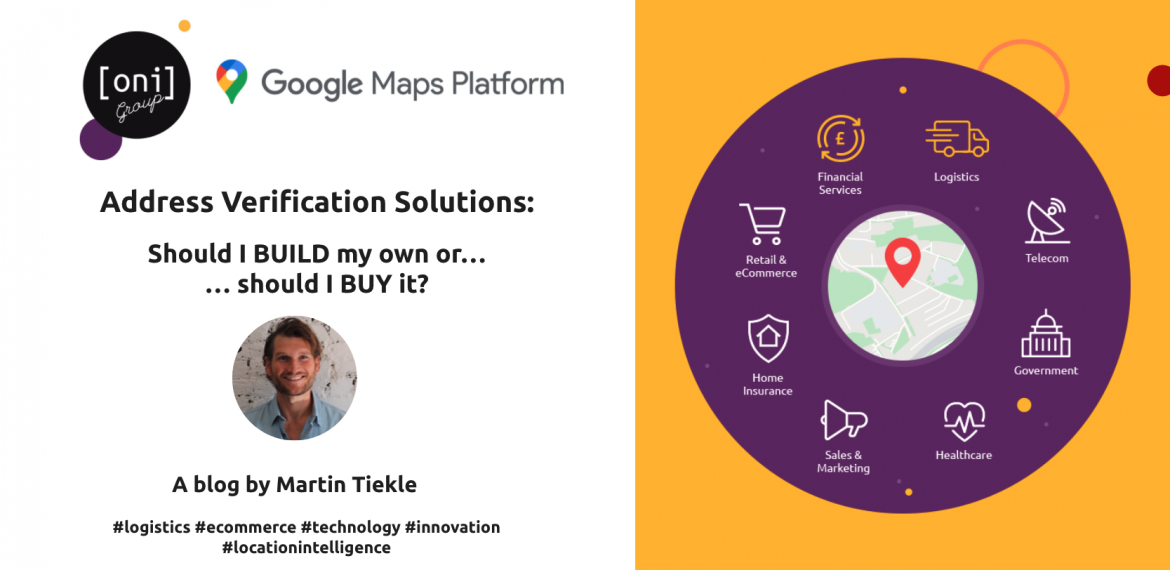What does a bank, a multinational e-commerce provider, a retailer and a local 2 person shop selling candles online all have in common? The answer is… your address. And if it’s wrong, everyone is in for a world of pain!
In this blog, we’ll be talking about address verification and looking at how some companies have tackled it and failed and how some companies have found success. We’ll review winning strategies and review the age-old technology concept of, “Do I build or do I buy?”
Firstly, is address verification actually a problem worth solving?
Well, let’s set the scene. According to Elogii, “15.05 billion deliveries [were] completed worldwide in 2020 at an average cost of US$6.40 per delivery”. Of that there were approximately 1.4 billion food orders, with an estimated average fail rate of 12% due to the food being delivered late, making 168 million orders having a problem. Now keep in mind this is just food delivery so let’s break this number down even further to examine the potential quantified impact across a number of delivery verticals.
Let’s say that incorrect addresses only accounted for 10% of that 12% food delivery fail rate, that’s still 16.8 million orders gone wrong due to addresses. While this is only a meagre 1.2% across 15 billion deliveries, the potential total cost of bad addresses is US$1.152 billion.
So yes, address verification is a problem worth solving
How are different companies solving address verification? Most e-commerce, retail and even financial services (including cutting edge FinTech companies!) fall into 3 buckets.
-
They don’t complete the delivery so rely on the rich address records of their 3rd party Logistics providers to verify address accuracy
-
They recognise that not all addresses are correct so invest in databases of millions of addresses to verify each address for each transaction post-conversion
-
Utilise out of the box address verification technology for all markets
Let’s review each strategy.
1 - Relying on 3rd party logistics providers.
This is most common and unfortunately is definitely the worst of the 3… Without any address verification, the poor 3PLs can literally receive anything and be expected to accurately deliver the package or credit card correctly. These companies are also relying on the technology/data that the 3PL uses, remember they are delivery companies, not technology companies.
2 - Invest in databases to verify each address
While this is a step up it’s, unfortunately, using a massive assumption. ‘Ye old Silver bullet theory’. One single address database to rule them all… and that, does not exist. If the customer has already entered an address and your database is good enough to flag it as being incorrect, how is it then rectified?
3 - Utilise out of the box address verification technology for all markets
The best of the 3, ‘capture it at the source or don’t capture it all’. Couldn’t agree more except… Once again you’re relying on the technology and data of a single provider to solve all your address problems across every market. Customers from one country will have a completely different method for address entry to another. Additionally, most of the time these solutions miss a key element, not, “Is the address right or wrong?” but “ What is wrong with the address?”
So what is the optimal solution?
Let’s breakdown the use cases in more detail to understand the problems, dispel the myths and then determine why different companies chose the strategies above:
1. If I use an address verification service on my front end it might slow down my time to conversion
- While in some cases this is true, it can also have an adverse effect on actual retention rates. If the customer had a bad experience due to no address verification according to Small Business Trends, “13% of Shoppers Never Come Back…”
2. We use a backend database that spans across many countries, if the address is flagged we just call the customer directly
-
A valid response, but how scalable is this? For every 100,000 orders, who will make the 1200 phone calls to rectify the address? How long does each call take? If the driver is making these calls then they will definitely not be able to maximise their deliveries per day. This directly impacts not only the bottom line but support issues for poor customer experiences
-
It’s also worth considering that customers hate this! Elogii puts it at “80% of customers cite convenience, speed, knowledgeable help, and friendly service as the most important elements of good customer experience.
3. We have a front end address validation service that stops customers from entering incorrect addresses
-
Depending on the provider this may be true but it’s also going to prevent customers who cannot find their address from even completing the transaction.
-
How much of the current dropout rate is directly related to customers from new housing developments or new areas where their address hasn’t been captured?
4. Our 3rd party logistics provider manages the end to end delivery so that’s their job
-
Absolutely, but will the customer blame the 3PL or will it come to you for support when their delivery is late or missing?
-
How many support tickets are caused by delivery issues that technically have nothing to do with the platform or original vendor?
-
Some 3PLs will even charge the vendor due to a failed delivery or for redelivery if the original address was wrong. Does the customer then pay this penalty?
5. We’re a bank so addresses aren’t as key for us as e-commerce or retail. So as long as we have a record we are ok.
-
This is not the case. Not only are addresses a key tool that fraudsters use to defraud financial institutions, but addresses are also primarily used to satisfy federal banking regulations and certain identity verification requirements
-
Associated fines are monumental, Westpac in Australia was fined AU$1.3B for poor customer due diligence that led to money laundering through its banking services.
-
Also if a customer cannot provide an address in many jurisdictions they can’t even sign up for the service
To really solve these issues and more, regardless of the industry we need to think more carefully about customers, their addresses and our services. How tightly linked are all 3? In most cases, extremely.
So here’s a few questions to ask yourself:
-
What happens if my customer cannot find their address?
-
What happens if my current service doesn’t detect a customer address error?
-
If they have an issue with the delivery of the product, who do they contact?
-
How many support tickets directly cite the address as the cause of an incorrect or missed delivery?
Now if you’ve got this far then perhaps your company is having these issues. For some, you may actually be feeling inspired. Inspired enough to go and build something from scratch. For many digital natives, this seems to be the approach. However, ‘build vs buy’ is far more complex.
Build vs Buy
At the top, we stated that whether you're in finance, retail or e-commerce customer addresses are that common denominator. What is also, unfortunately, the commonality, is that even though it touches each customer and is a minimum requirement in today’s business world, none of those industries is specialists in address data or address verification technology. It’s like the Beatles creating a computer company (a nod to all those that get that reference).
How long would it take to buy the address data, consistently add/manage it, create a secure API and fundamentally build logic to handle the local nuances of every single market you work in? The answer is, way longer and with a lot more resources than it would to just buy a solution.
Now I'm not saying that this is always the solution. On the contrary, you want the best of both worlds. Think of it as a recipe. You want the list of the fundamental (and best) ingredients coupled with a clear direction at each point. What is then needed is your own unparalleled knowledge of your customers, the intended experience you strive for and your business requirements.
Written by Martin Tiekle, Address Verification Specialist & Global Head of Partnerships
 Martin has been at Oni for the past 10 years, originally from our ANZ office, he started our Asian business in Singapore and is now based in London working with our largest customers globally. Martin leads our commercial consulting team specialising in logistics, first and last mile delivery and telematics.
Martin has been at Oni for the past 10 years, originally from our ANZ office, he started our Asian business in Singapore and is now based in London working with our largest customers globally. Martin leads our commercial consulting team specialising in logistics, first and last mile delivery and telematics.
Get access to new Google technology
At OniGroup we are location experts and in particular for Google Maps Platform. If you’re an existing customer your account manager will be in touch with you to set up a free workshop on each of the above. For everyone else, don’t stress, we want to work with you leveraging these new technologies, today.
Join the exclusive Location Intelligence Program to learn about:
• Enhancing user experiences: Making exploring and navigating the world more immersive, intuitive, and informative.
• Empowering developers: Providing advanced tools to build location-based solutions that address diverse needs.
• Supporting businesses: Offering features that optimize operations and enable data-driven decision-making.

